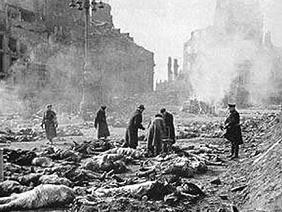The Myth of the Good War: America in World War II
60 Years Ago, February 13-14, 1945: Why was Dresden Destroyed

In the night of February 13-14, 1945, the ancient and beautiful capital of Saxony, Dresden, was attacked three times, twice by the RAF and once by the USAAF, the United States Army Air Force, in an operation involving well over 1,000 bombers. The consequences were catastrophic, as the historical city centre was incinerated and between 25,000 and 40,000 people lost their lives.[1]
Dresden was not an important industrial or military centre and therefore not a target worthy of the considerable and unusual common American and British effort involved in the raid. The city was not attacked as retribution for earlier German bombing raids on cities such as Rotterdam and Coventry, either. In revenge for the destruction of these cities, bombed ruthlessly by the Luftwaffe in 1940, Berlin, Hamburg, Cologne and countless other German towns big and small had already paid dearly in 1942, 1943, and 1944.
Furthermore, by the beginning of 1945, the Allied commanders knew perfectly well that even the most ferocious bombing raid would not succeed in “terrorizing [the Germans] into submission,”[2] so that it is not realistic to ascribe this motive to the planners of the operation. The bombing of Dresden, then, seems to have been a senseless slaughter, and looms as an even more terrible undertaking than the atomic obliteration of Hiroshima and Nagasaki, which is at least supposed to have led to the capitulation of Japan.
In recent times, however, the bombing of countries and of cities has almost become an everyday occurrence, rationalized not only by our political leaders but also presented by our media as an effective military undertaking and as a perfectly legitimate means to achieve supposedly worthwhile objectives. In this context, even the terrible attack on Dresden has recently been rehabilitated by a British historian, Frederick Taylor, who argues that the huge destruction wreaked on the Saxon city was not intended by the planners of the attack, but was the unexpected result of a combination of unfortunate circumstances, including perfect weather conditions and hopelessly inadequate German air defenses.[3]
codondesastre.blogpot.com recomienda el presente artículo. codondesastre endorses Global Research. Dr. A. M. Quevedo Goicoechea
No hay comentarios:
Publicar un comentario